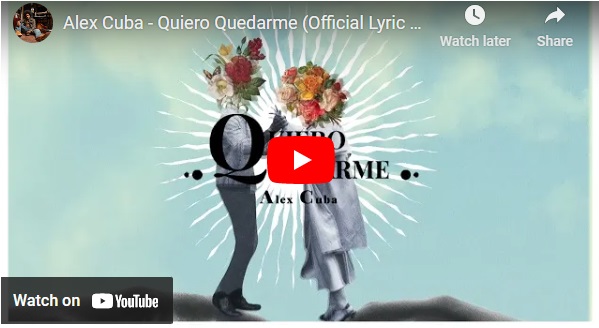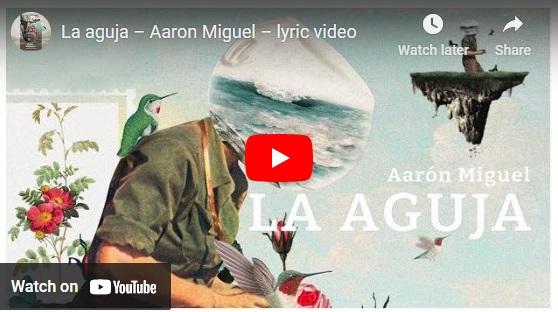It seems appropriate that our conversation with Alex Cuba comes exactly one year and one day after the acclaimed singer-songwriter from Smithers, BC, won his first-ever Grammy Award. That was in the Best Latin Pop Performance category, for the album Mendo, and came after three earlier nominations.
“I found out [that I won the Grammy] in the most Canadian way possible, driving home in a snowstorm,” says Cuba. “I’d just played two symphony concerts in the Okanagan, beautiful shows that made me feel properly back onstage after lockdowns. Some areas lacked cell service, so my U.S. publicist couldn’t reach me. When he finally did, he said ‘I need a quote. You just won a Grammy!’”
Cuba is no stranger to awards. He’s previously won four Latin Grammys, including a Best New Artist nod in 2010, along with two JUNO Awards, and, most recently, a 2022 SOCAN Hagood Hardy Award.
He’s certainly not resting on his laurels now, with multiple projects on the go. His first release of 2023 is the track “Quiero Quedarme,” the third advance single from an EP arriving later in the year.
“I see this project as a perfect marriage between my organic vibe and the electronic elements,” says Cuba. “During the pandemic, as I was building the album that won a Grammy, I started writing these songs I saw as having an electronic soul feel.
“It’s a completely solo record, with one voice, one guitar, and at least 20 songs. This is connected to my recent solo tour, which was so inspiring. I’m doing this because I’m concentrating on songwriting. Everything you hear now is so hook-focused that the art of writing songs, with bridges that feel natural, seems to be becoming rare. For this acoustic album I already have seven pieces recorded. It will be primarily Spanish, as I want it to be very honest and soulful, and that’s easier with my mother language.
“One of the most important things to me in music is melody,” he continues. “A melody can contain huge amounts of information, and it’s capable of making people feel something. I believe that’s why this solo Canadian tour I just finished was such a success. It was just me onstage, and people were crying, laughing, having a blast.
“I believe melodies are the gift in music. You can spend three months, or years, writing lyrics to a melody that you have. Most people can do that, but the melody is the true gift, the one that comes from you don’t know where.”
“My fans stay because I keep them guessing where I’ll go next”
Cuba continues to challenge himself musically, as is showcased on the stylistic variety of his catalogue – one that features Latin, soul, pop, and rock elements. “My biggest pride in music is that in eight albums, no song of mine sounds like another,” he says. “My fans stay because I keep them guessing where I’ll go next. That’s a healthy thing for a musician and songwriter. If you only do one kind of music and you get your fans used to that, then when you want to do something different, you’re trapped. I’m so happy to have that freedom creatively.”
Unlike so many peers, he has reason to feel grateful for the pandemic. Unable to maintain his usual busy touring schedule, he took the opportunity to build a home studio, which has provided a huge boost in his creativity.
“I recorded Mendo, the Grammy-winning album, in my living room,” he says, “but I’ve now turned our garage in the back into a studio. It has a stable temperature, so my instruments stay in tune. I get lost in there, and that’s so inspiring.”
This new facility gives Cuba the opportunity to pursue some of the production work he’s now being offered. “What I’m proudest about with my Grammy is that it says ‘Alex Cuba – Artist, Producer, Engineer,’ so it feels like three Grammys in one. The morning after I won, I was flooded with texts and e-mails from artists wanting me to produce them. I’m looking forward to spending more time at home working on productions, while being careful that it never feels like a job.”
Some ongoing production work has been with Aarón Miguel, an artist Cuba signed to his record label, Caracol Records. “I’m also finishing up music for Mi Tierra- Homeland, an audio book by David Lindes, an American friend of mine,” says Cuba. “It’s a brilliant book about migration trauma, with songs to the stories, and I’m adding instrumentation to, and producing, those.”
He’s also excited about yet another future project. “You’re the first person to know about this, and it’s called Voices of My Family. I’m recording songs with members of my family, and I see this as a potential mini-documentary, where I travel to Cuba to record and film more.
“I hope I can keep borrowing from the infinite universe of music. I believe music is the biggest gift we have.”

